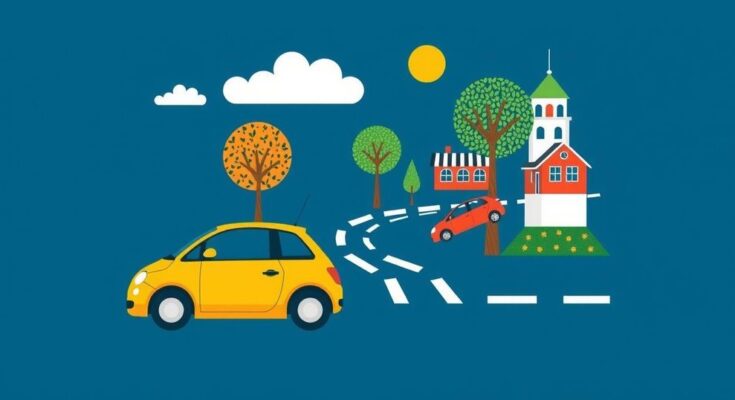A report by the Union of Concerned Scientists highlights that reducing car reliance could save the U.S. $6.2 trillion and improve public health and equity, arguing that diversified transport options are essential for climate change mitigation. The study advocates for a 27% reduction in vehicle miles traveled by 2050, emphasizing the need for policies that enable access to various travel modes as a means to achieve significant societal benefits.
A new report from the Union of Concerned Scientists reveals that reducing Americans’ reliance on driving would not only assist with climate change mitigation but also yield a staggering financial benefit of $6.2 trillion. This approach emphasizes the importance of diversifying transport options beyond merely electrifying vehicles. The report, titled “Freedom to Move,” argues that enabling people to access different modes of transportation is crucial for achieving net-zero emissions. By decreasing vehicle miles traveled by 27% between 2035 and 2050, the U.S. could avoid building $201 billion in new energy infrastructure required for an expanded electric vehicle fleet. Furthermore, the initiative could result in a $128 billion savings in public health costs by reducing emissions and pollution associated with both electric and gas-powered vehicles. It has been estimated that such a reduction in usage could prevent 250,000 car crash fatalities and 3.7 million injuries, considerably lowering societal costs related to accidents. The findings suggest that U.S. drivers could collectively save $5.9 trillion on car payments, gas, insurance, and other vehicle-associated expenses by emphasizing reduced car dependence, even if households retain some driving. Kevin Shen, the lead author of the report, asserts, “What we find is that reducing VMT and making sure to provide more transit options would be the most equitable way to make these kinds of changes, and would provide the most benefits to the people out there.” However, the commitment to changing American transportation behavior is formidable. Historically entrenched auto-centric industries have influenced policies that limit transportation choices and favor fossil fuel dependency. The automotive, fossil fuel, and road-building sectors spent $104 million on lobbying and $14 million on political contributions in 2023 alone to support policies against efficient transportation solutions. The report highlights that approximately 30% of U.S. residents do not drive, creating a pressing need for inclusive transportation options that do not exclusively privilege automobile users. Additionally, 60% of Americans live in neighborhoods where housing and transportation costs are unmanageable, with communities of color facing a higher likelihood of being economically burdened. In their endeavor to rectify the `car-culture’ paradigm, the authors frame their vision around establishing a travel landscape centered on various transportation modes, thus redefining “freedom” to encompass choices beyond merely driving. This alternative approach presents a significant opportunity to address climate issues effectively while improving the quality of life for all residents.
The article addresses the pressing issue of car dependence in the United States and its association with economic burdens, health problems, and environmental concerns. It references a report by the Union of Concerned Scientists that argues for significant policy changes aimed at reducing vehicle miles traveled (VMT) in order to simultaneously improve public health, equity, and the environment. By emphasizing a multi-modal transportation approach and reducing reliance on cars, the study presents a comprehensive strategy that could lead to substantial financial savings and better overall quality of life for residents while helping to meet climate goals.
The findings from the Union of Concerned Scientists underscore the urgency of reducing vehicle dependence as an effective strategy to combat climate change while realizing significant economic benefits and improving community health and equity. The proposed changes promise to enhance transportation inclusivity, offering diverse options to all individuals, thereby redefining what it means to have freedom in mobility. Therefore, addressing these challenges requires not only policy shifts but also a collective effort to challenge the longstanding norms associated with car culture in America.
Original Source: usa.streetsblog.org




